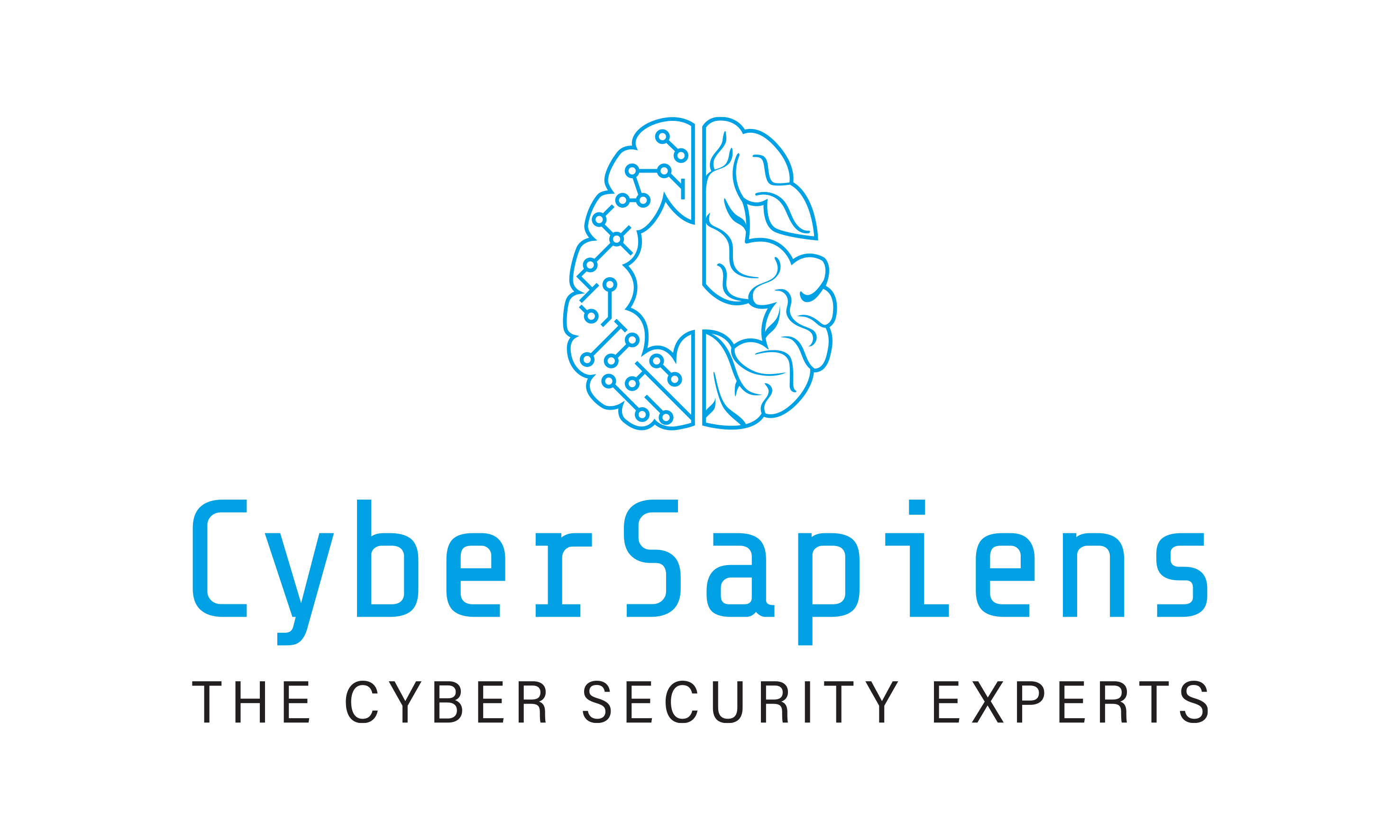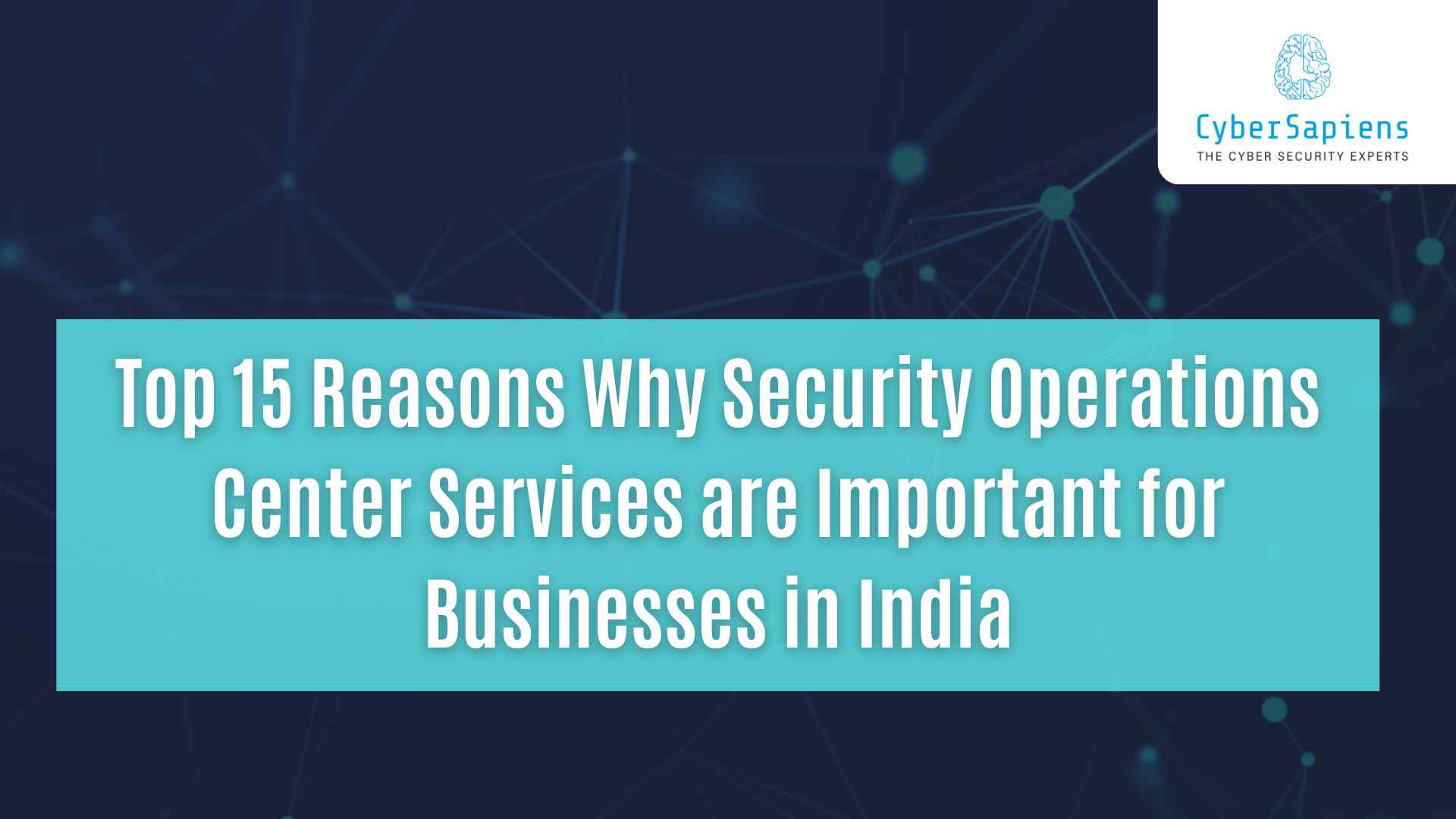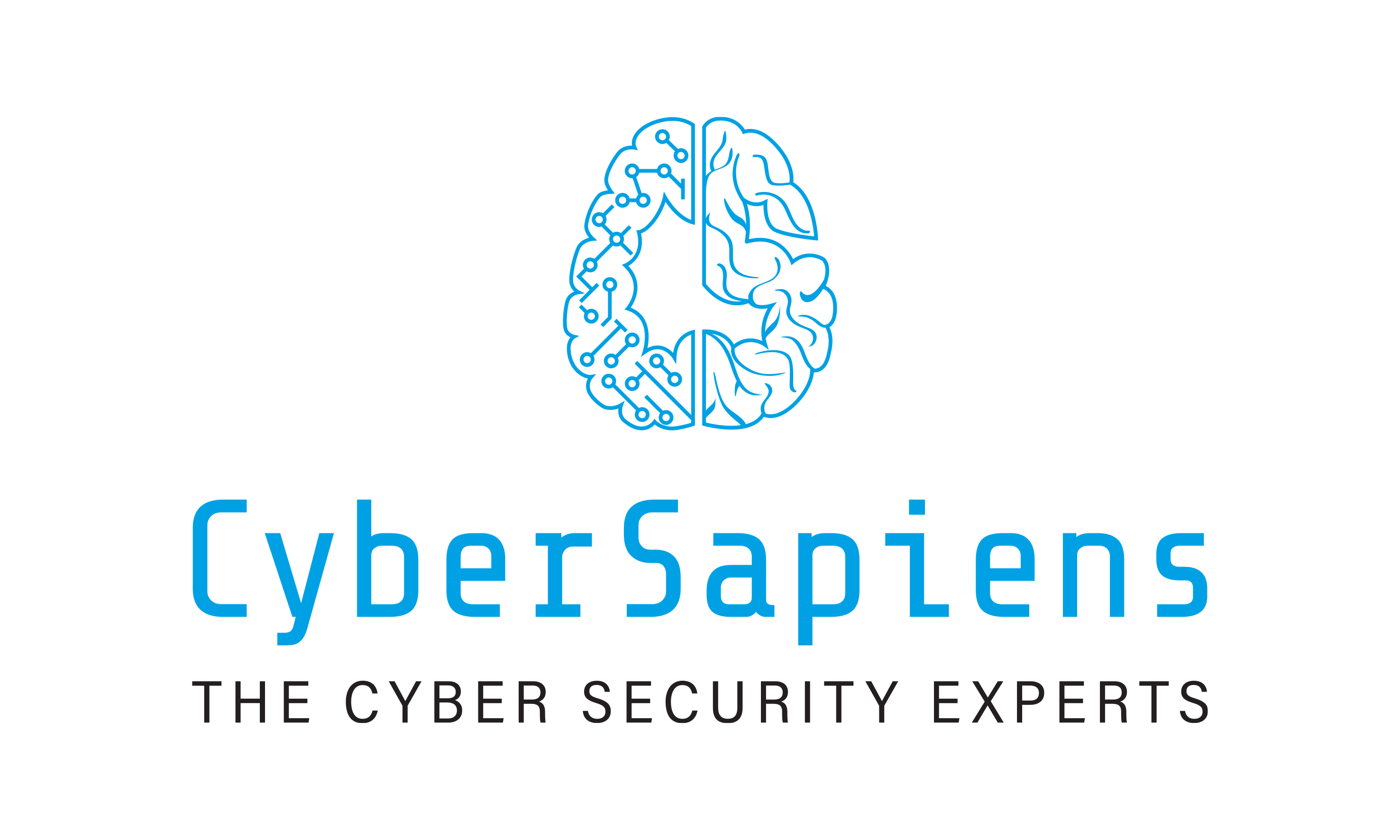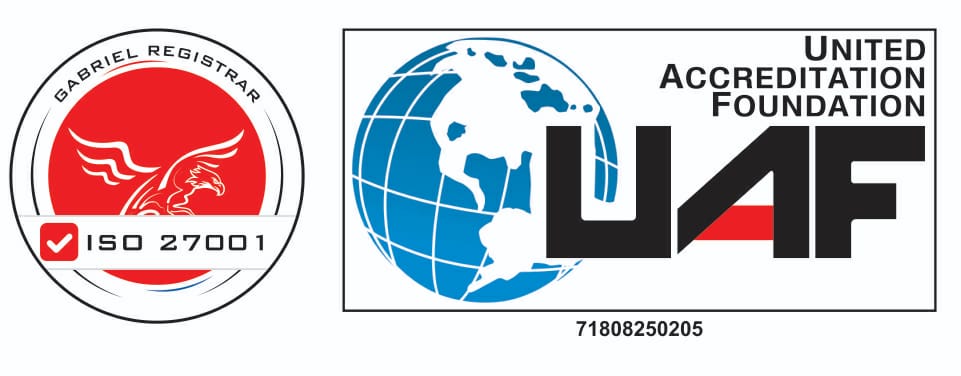Technology is rapidly advancing and transforming the way businesses operate, cybersecurity has become a top priority for organizations of all sizes and types. The risk of cyber threats, data breaches, and cyber-attacks is on the rise, and businesses in India are no exception. This has given rise to the need for robust security measures, such as Security Operations Center (SOC) services, to protect organizations from these threats.
A Security Operations Center (SOC) is a centralized unit that uses technology, processes, and people to monitor, detect, and respond to cybersecurity incidents. SOC services provide 24/7 monitoring, incident response, and vulnerability management, helping organizations identify and mitigate potential threats before they cause harm.
In this article, we will explore the Top 15 Reasons Why Security Operations Center Services are Important for Businesses in India.
List of Top 15 Reasons Why Security Operations Center (SOC) Services are Important for Businesses in India
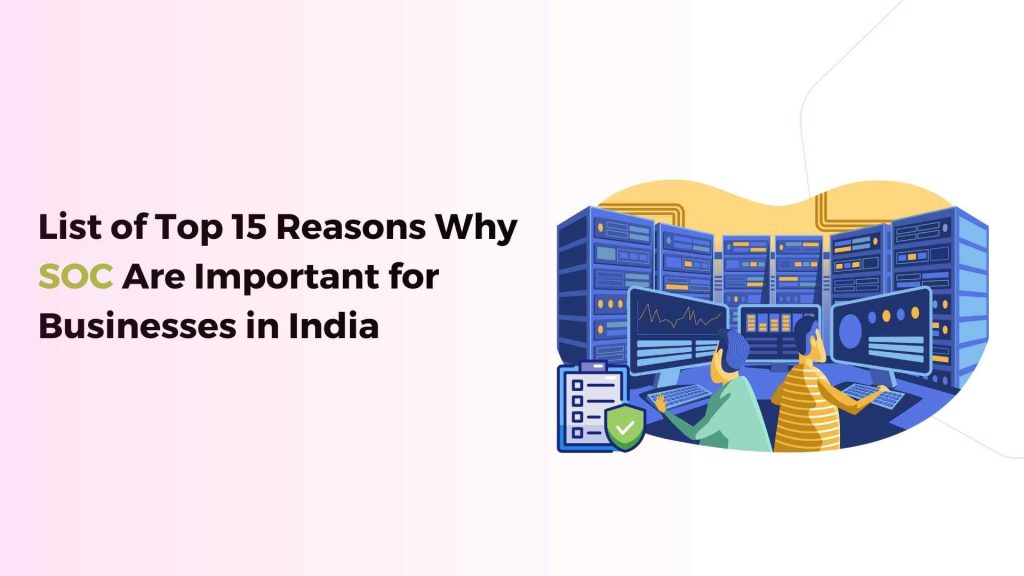
Here is the list of the Top 15 Reasons Why Security Operations Center (SOC) Services are important for Businesses in India:
1. Protection Against Advanced Cyber Threats
Cyber threats are becoming increasingly sophisticated, and traditional security measures may not be enough to protect against them. A SOC provides advanced threat detection and response capabilities, helping to identify and mitigate threats that may have evaded traditional security measures.
2. Compliance with Regulatory Requirements
India has strict cybersecurity regulations, such as the Information Technology (IT) Act, of 2000, and the Personal Data Protection Bill (PDPB), of 2019, which require organizations to implement robust cybersecurity measures. A SOC helps businesses to comply with these regulations by providing a proactive approach to cybersecurity.
3. Real-Time Threat Detection and Response
A SOC provides real-time monitoring and incident response capabilities, helping to detect and respond to cyber threats before they cause harm. This reduces the risk of downtime, data loss, and reputational damage.
4. Expert Security Analysis
A SOC team consists of experienced security analysts who have in-depth knowledge of cybersecurity threats and vulnerabilities. This expertise helps to identify potential threats and develop effective mitigation strategies.
5. Cost Savings
Implementing a SOC in-house can be costly, requiring significant investment in technology, training, and personnel. Outsourcing SOC services provides cost savings and access to advanced technology and expertise without the high upfront costs.

6. 24/7 Monitoring and Incident Response
A SOC provides 24/7 monitoring and incident response capabilities, ensuring that potential threats are identified and mitigated quickly, regardless of the time of day or night.
7. Enhanced Incident Response
A SOC has a defined incident response plan, which helps to minimize the impact of a security incident. This plan includes procedures for containment, eradication, recovery, and post-incident activities.
8. Vulnerability Management
A SOC provides vulnerability management services, helping to identify and prioritize vulnerabilities and develop effective mitigation strategies.
9. Continuous Security Monitoring
A SOC provides continuous security monitoring, helping to identify potential security risks and vulnerabilities and develop effective mitigation strategies.
10. Security Information and Event Management (SIEM)
A SOC uses Security Information and Event Management (SIEM) systems to collect, store, and analyze security-related data from various sources. This helps to provide real-time insights into security threats and vulnerabilities.

11. Log Collection and Analysis
A SOC collects and analyzes log data from various sources, helping to identify potential security threats and vulnerabilities.
12. System and Network Monitoring
A SOC provides system and network monitoring, helping to identify potential security threats and vulnerabilities in real time.
13. Identification and Mitigation of Insider Threats
A SOC helps to identify and mitigate insider threats, which can be a significant risk for organizations.
14. Enhanced Security Posture
A SOC helps to enhance an organization’s security posture by providing a proactive approach to cybersecurity, identifying potential threats and vulnerabilities, and developing effective mitigation strategies.
15. Business Continuity
A SOC helps to ensure business continuity by providing a proactive approach to cybersecurity, minimizing the risk of downtime, data loss, and reputational damage.
Why Do Businesses in India Need SOC Services?
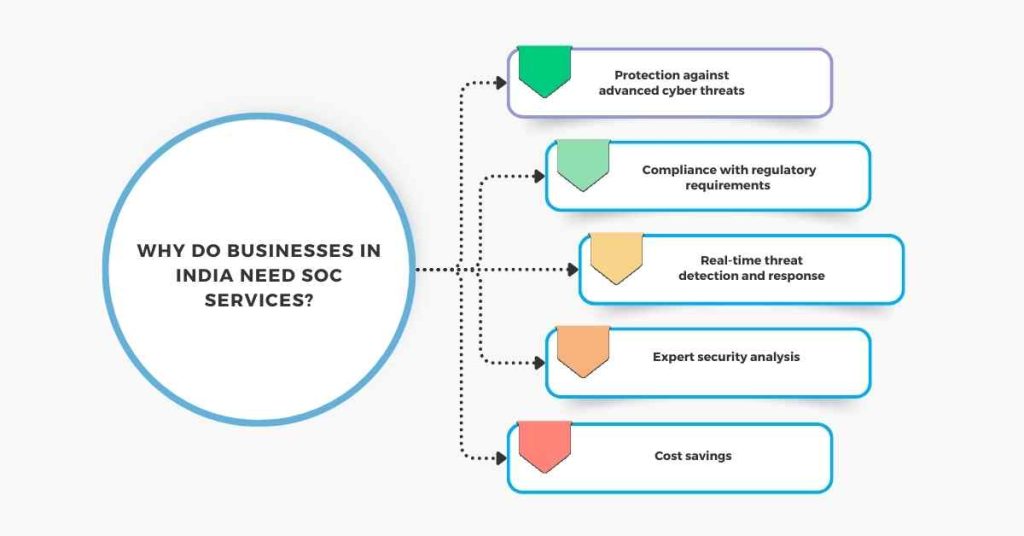
Businesses in India need SOC services for the following reasons:
1. Protection against advanced cyber threats
Cyber threats are becoming increasingly sophisticated, and traditional security measures may not be enough to protect against them. A SOC provides advanced threat detection and response capabilities, helping to identify and mitigate threats that may have evaded traditional security measures.
2. Compliance with regulatory requirements
India has strict cybersecurity regulations, such as the Information Technology (IT) Act, of 2000, and the Personal Data Protection Bill (PDPB), of 2019, which require organizations to implement robust cybersecurity measures. A SOC helps businesses to comply with these regulations by providing a proactive approach to cybersecurity.
3. Real-time threat detection and response
A SOC provides real-time monitoring and incident response capabilities, helping to detect and respond to cyber threats before they cause harm. This reduces the risk of downtime, data loss, and reputational damage.
4. Expert security analysis
A SOC team consists of experienced security analysts who have in-depth knowledge of cybersecurity threats and vulnerabilities. This expertise helps to identify potential threats and develop effective mitigation strategies.
5. Cost savings
Implementing a SOC in-house can be costly, requiring significant investment in technology, training, and personnel. Outsourcing SOC services provides cost savings and access to advanced technology and expertise without the high upfront costs.
How to Choose the Right SOC Service Provider?
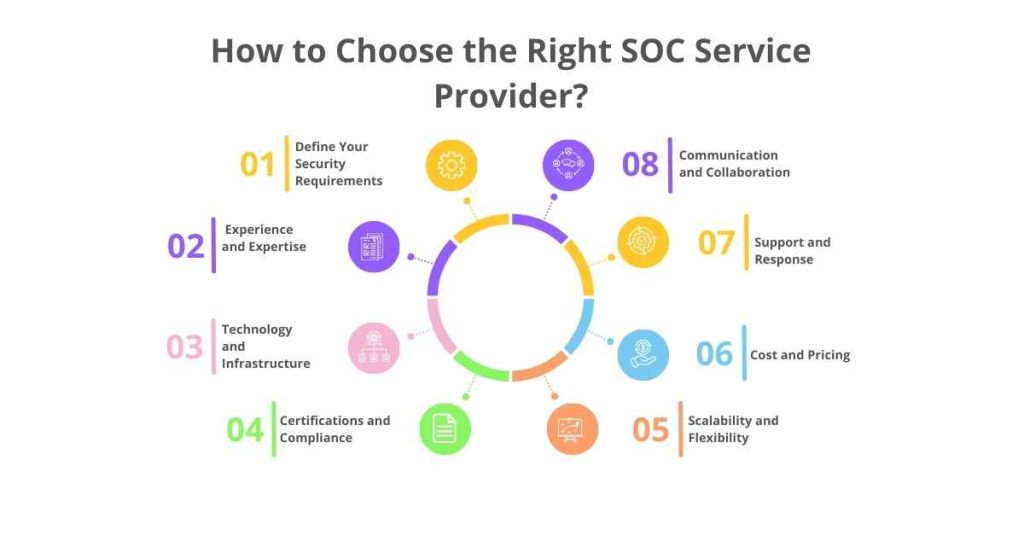
Choosing the right Security Operations Center (SOC) service provider can be a daunting task, especially with the numerous options available in the market. However, making the right choice is crucial to ensure the security and integrity of your organization’s systems and data. Here are some tips to help you choose the right SOC service provider:
1. Define Your Security Requirements
Before choosing a SOC service provider, you need to define your organization’s security requirements. This includes identifying your security goals, assessing your risk posture, and determining the level of security you need. This will help you to filter out providers that do not meet your requirements.
2. Experience and Expertise
Look for a SOC service provider that has extensive experience and expertise in providing security services. This includes experience in handling security incidents, threat intelligence, and security analytics. A provider with a team of experienced security analysts can provide better guidance and support.
3. Technology and Infrastructure
The SOC service provider you choose should have advanced technology and infrastructure to detect and respond to security threats. This includes a robust Security Information and Event Management (SIEM) system, threat intelligence platforms, and security analytics tools.
4. Certifications and Compliance
Ensure that the SOC service provider is certified by reputable organizations such as the International Organization for Standardization (ISO) or the Payment Card Industry (PCI). Compliance with regulatory requirements such as the General Data Protection Regulation (GDPR) or the Health Insurance Portability and Accountability Act (HIPAA) is also essential.
5. Scalability and Flexibility
Choose a SOC service provider that can scale to meet your organization’s growing security needs. The provider should be flexible in terms of the services they offer and should be able to adapt to changing security requirements.
6. Cost and Pricing
Evaluate the cost and pricing of the SOC service provider. The cost should be reasonable and aligned with the services provided. Look for providers that offer transparent pricing and flexible payment plans.
7. Support and Response
Ensure that the SOC service provider offers 24/7 support and response to security incidents. The provider should have a clear incident response plan and should be able to respond quickly to security threats.
8. Communication and Collaboration
Choose a SOC service provider that communicates and collaborates effectively with your organization. The provider should be able to provide regular security updates and should be willing to work closely with your security team.
Summary
Here is the summary of the Top 15 Reasons Why Security Operations Center Services are Important for Businesses in India article.
- Protection Against Advanced Cyber Threats
- Compliance with Regulatory Requirements
- Real-Time Threat Detection and Response
- Expert Security Analysis
- Cost Savings
- 24/7 Monitoring and Incident Response
- Enhanced Incident Response
- Vulnerability Management
- Continuous Security Monitoring
- Security Information and Event Management (SIEM)
- Log Collection and Analysis
- System and Network Monitoring
- Identification and Mitigation of Insider Threats
- Enhanced Security Posture
- Business Continuity
Conclusion
In conclusion, SOC services are essential for businesses in India to ensure the security of their IT systems and data. By providing enhanced threat detection and response, improved incident response, compliance with regulatory requirements, and access to advanced security expertise, SOC services help organisations protect themselves against cyber threats and maintain customer trust and confidence.
As the threat landscape continues to evolve, Indian businesses must prioritize security and consider outsourcing SOC services to stay ahead of emerging threats.
FAQs: Top 15 Reasons Why Security Operations Center Services are Important for Businesses in India
1. What is a Security Operations Center (SOC)?
Ans: A Security Operations Center (SOC) is a centralized unit that uses advanced tools, technologies, and processes to monitor, detect, and respond to cyber threats in real-time. A SOC team consists of experienced security professionals who analyze security data from various sources to identify potential threats and take proactive measures to prevent security breaches.
2. Why do I need SOC services for my business in India?
Ans: You need SOC services to protect your business from cyber threats, including hacking, phishing, malware attacks, and more. SOC services help you detect and respond to security threats in real-time, ensuring the security of your IT systems and data.
3. What are the benefits of outsourcing SOC services?
Ans: The benefits of outsourcing SOC services include cost savings, access to advanced security expertise, improved incident response, and compliance with regulatory requirements. Outsourcing SOC services also helps you stay ahead of emerging threats and improves your overall security posture.
4. How does a SOC team monitor and detect security threats?
Ans: A SOC team uses advanced tools and technologies, including security information and event management (SIEM) systems, threat intelligence feeds, and security analytics platforms. They analyse data from various sources, including network logs, system logs, and threat intelligence feeds, to identify potential security threats.
5. What is the role of threat intelligence in SOC services?
Ans: Threat intelligence is critical in SOC services by providing information on emerging threats, attack vectors, and threat actors. This intelligence helps a SOC team stay informed and prepared to respond to security threats in real-time.
6. Can I implement a SOC in-house, or do I need to outsource it?
Ans: While you can implement a SOC in-house, outsourcing SOC services is often more cost-effective and efficient. Outsourcing SOC services provides you with access to advanced security expertise, reduces the burden on your internal IT team, and ensures compliance with regulatory requirements.
7. How do I choose the right SOC service provider for my business in India?
Ans: When choosing a SOC service provider, consider factors such as their experience, expertise, and certifications. Look for providers with experience in serving businesses in India and ensure they have the necessary certifications, such as ISO 27001 and PCI DSS.
8. What is the average cost of SOC services in India?
Ans: The average cost of SOC services in India varies depending on the provider, scope of services, and the size of your business. However, on average, SOC services can cost between ₹50,000 to ₹500,000 per month, depending on the complexity of services and the size of your organization.
9. How do SOC services help with compliance and regulatory requirements?
Ans: SOC services help with compliance and regulatory requirements by implementing security controls and monitoring systems to detect potential threats. A SOC team ensures that your organization meets regulatory requirements, including the Information Technology Act, 2000, and the RBI’s guidelines on cyber security.
10. How can I measure the effectiveness of my SOC services?
Ans: You can measure the effectiveness of your SOC services by tracking key performance indicators (KPIs), such as the number of security incidents detected and responded to, the average response time to security incidents, and the overall security posture of your organization.

